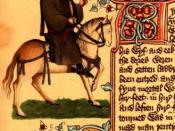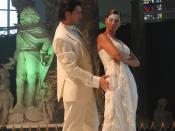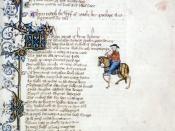The Wife of Bath is perhaps the most well developed character in the Canterbury Tales. She is a very loud and strongly opinionated character. She freely discusses many topics that were considered taboo for women at the time The Canterbury Tales were written. A great deal is learned about her past life in her prologue, which is unusual in its lengthiness. In her prologue, the Wife of Bath reveals that she has had five husbands, three who were old and rich, and two younger ones. Her first three husbands were kind to her, while the last were wicked. She describes in detail her relationships with her husbands, and how she gained control over each one.
The Wife of Bath is very interesting because she appears to be the ideal representation of what the church of Chaucer's time would have considered an evil woman. The Wife is aware that her ideas conflict with the religious doctrines, so from the very beginning she is on the defense, and she mocks the authority of the church by citing scripture to prove her own case.
But, sadly, her logic is off, and she selectively chooses scripture that will support her ideas, while ignoring foundational Biblical principles. For example, when she cites the verse in Genesis that tells us to "be fruitful Bolock2 and multiply" (III 28-29) she ignores all of the commands found throughout the entire Bible on purity and chastity. She also quite badly misquotes Ptolemy (lines 188-190). Both of these examples make the Wife of Bath look ignorant, and therefore she is a poor representation of women.
Throughout the prologue, Wife of Bath waxes on freely not only about her desire for sex, but more importantly her desire to gain sovereignty over her husbands. Instead of seeking equality in her marriages, she instead strives for power. In both her tale and her prologue she argues that sovereignty over her husband is what any woman wants most in the world. Her tale ends with the knight and his new wife achieving perfect happiness once the wife had gained control. The Wife of Bath claims that this was also the case with all of her marriages.
Obviously the Wife of Bath is in favor of women's rights in a marriage, however, I do not think that this qualifies her as a feminist. Instead of using either intelligence to achieve equality in her marriages, she uses her sexuality gain dominance. She tells of how she used to deny sex to her husbands until the had promised to give her money "Ther wolde I chide and do hem no plesaunce;/ I wolde no lenger in the bed abide/ If that I felte his arm over my side, / Til he hadde maad his raunsom unto me;" (lines 414-417) In addition to her sexuality, the Wife of Bath also uses guilt and jealousy to get control. She used to accuse her husbands of cheating (when she knew that they hadn't been) to make them feel guilty. And, when her fifth husband, Janekin, strikes her on the head, she plays upon his guilt and pretends to be dead until he swears that she will have control over their marriage.
Bolock 3 The Wife strives for power in her marriages, but she does not seem to care that society itself revolves around men. A feminist would be concerned with how all of the positions of power during Chaucer's time were held by men, but the Wife of Bath is concerned only for her personal situation.
The Wife of Bath is also very shallow; she sees her beauty as her one asset. She has used it to gain everything that she presently has in life. But, she now has a problem, because she is growing old and her beauty is fading (lines 480 - 484). She has spent her entire life since the age of twelve attracting men, marrying them, and then struggling to gain sovereignty over them, and she fears that she will now her game will be over.
In conclusion, I believe that when one closely examines the Wife of Bath's prologue and tale, there is no way that she could be considered either a feminist or a good representation of women. She is overbearing; her one desire in life is to have a man and to be in control of him. I think that a true feminist would thrive in a state of singleness, and only desire equality if married. Also, she is a very bad representation of women in general. She even makes the Pardoner in the tale reconsider his plans to marry, because she claims every woman has her same bold desires to have power over men. The Wife of Bath, while a very remarkable character, is not in possession of any traits that most women would desire.


